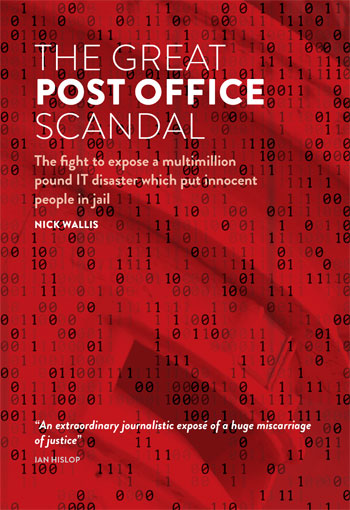
It was a tweet that any journalist might have ignored. It came when Nick Wallis was presenting the breakfast show on BBC Radio Surrey from a taxi owner asking if he could pitch for the local radio station’s taxi account.
The “one man and a dog” station had no taxi account, but this being local radio, Wallis asked whether the taxi owner would come and tell some of his best stories.
The reply? “Oh, I have got a story all right. Call me after the show.”
Wallis made the call immediately after the programme, and although no hint was given about the story, there was something urgent about Davinder’s response.
In a classic tale of journalism, the chance online encounter led Wallis to the story of his career, which has enveloped his working life for more than a decade and on to awards and fame, if not fortune.
It also led to Wallis playing a major role in uncovering one of the greatest scandals in British public life of the last twenty years.
“Davinder turned out to be the husband of Seema Misra who had been thrown into prison on her son’s 10th birthday while pregnant, for supposedly stealing £74,000 from the Post Office,” recalls Wallis.
Davinder insisted not only that his wife was innocent but that it was the Post Office computer in her sub-Post Office that was at fault.
It was November 2010.
I felt so sorry for the postmasters and it was just going to keep happening unless we do something.
Starting to dig
A quick Google search revealed that Computer Weekly had covered the issue the previous year and cited seven other cases and there was also a website, Justice for Subpostmasters Alliance.
“Within an hour, I was speaking to Alan Bates, the founder of the organisation who is a very rational, cogent individual who explained in detail the problems his members had been having,” said Wallis who has always worked in broadcasting.

Yet, apart from that article in Computer Weekly, there was no sign that anything had been done about the story.
After interviewing an obviously distressed Davinder who was “totally and utterly credible”, Wallis persuaded the BBC’s regional investigative programme Inside Out South to broadcast a segment which he presented. Immediately, the emails started coming in from those saying the same thing had happened to them.
Wallis tried to take the story national but there was little interest at the time from Newsnight and Private Eye did not respond.
The local radio presenter “nicked” the BBC television broadcast, put it on his blog, and the responses started coming in.
“I felt so sorry for the postmasters and it was just going to keep happening unless we do something,” said Wallis who “had another crack” at Private Eye which published the first of many articles on the subject in September 2011.
I got to know some of the key protagonists and I started to receive leaks of decent information.
Lucky break
Then Wallis had a stroke of luck. He got freelance presenting work for Channel 5’s crime show Caught on Camera. It paid as much as BBC Surrey but gave him much more free time to plug away at the Post Office story and he became a freelance crime reporter with a huge story on his hands.
“I used my blog as an outlet for the story which brought me into contact with more people. I got to know some of the key protagonists and I started to receive leaks of decent information,” Wallis explains.
He persuaded BBC’s The One Show to carry two investigative pieces which flushed out even more information and that led to Panorama in 2015.
Yet despite continuing interest from Private Eye and Computer Weekly, because of Fujitsu’s Horizon computer system at the heart of the issue, the Post Office scandal failed to cross the crucial threshold to become a major national story.
Wallis believes a number of factors were responsible. There was no big newspaper campaign behind the story.

Bates was a great campaigner but didn’t like doing interviews and from 2013 to 2019, the Post Office was in “batshit denial” and routinely sent warning legal letters to journalists planning to write about the issue.
It didn’t help that none of the sub-postmaster convictions had been overturned, or that many of them had been persuaded to plead guilty in return for lower sentences, while others had met the supposed deficits out of their savings.
Wallis failed to arouse any interest in a planned book. Some small publishers had a sniff but decided the legal risk was too great.
By then, Wallis had been plugging away at the story for eight years even though trying to get information out of the Post Office was “like getting blood out of a stone”.
A new battlefront was opened up together with the campaigning power of the Daily Mail.
Daily Mail comes onboard
Then he managed to get the personal email address of the then editor of the Daily Mail, Geordie Greig, who replied that the local sub-postmaster in the village where he had a weekend cottage had been bending his ear relentlessly about the Post Office story.
The next day, the Mail’s chief reporter Sam Greenhill was on the case and a new battlefront was opened up together with the campaigning power of the Daily Mail.
The real breakthrough came in 2019 when Bates and 554 fellow litigants took a civil case against the Post Office to the High Court and “the chickens started coming home to roost”.
Wallis wanted to cover the case every day but knew no news editor would fund a freelance to do that, so he tried crowd-funding.
To use the Kickstarter crowd funding programme, you have to reach your specified minimum. Wallis asked for £3,000 to cover a month’s worth of coverage and more than doubled his total within days.
He covered the case every day on his blog and was able to publish both transcripts and the texts of documents referenced in court.
It led to an award-winning series on Radio 4 – The Great Post Office Scandal – which attracted the attention of a senior literary agent but still no publisher was interested.
It needs more journalists crawling all over this story because then we will start to find where all the bodies are buried.
Justice starts to be served
More importantly, the information revealed in the civil case opened the floodgates for the Criminal Cases Review Commission. So far, seventy-two cases against sub-postmasters have been reversed in the Court of Appeal and at Southwark Crown Court, including that of Seema Misra, and more are expected this year.
The judge in the civil case was so concerned about the evidence given by Fujitsu and the Post Office that the file was referred to the Department of Public Prosecutions and on to the Metropolitan Police for investigation.
A statutory inquiry under Sir Wyn Williams will get under way this month (February) and that “should finally start to ask questions as to who knew what, when within the Post Office.”
Meanwhile, the capital value of the organisation has been written down to zero because of compensation claims that some estimate could reach £1 billion.
As for Wallis, in recent years, he says the freelance money generated has been “appreciable” although until then it had been sporadic and a “labour of love”.
Last year, he finally published his book – The Great Post Office Scandal – although only a small specialist legal publisher, Bath Publishing, would take the risk with its first mainstream book. It was serialised in the Daily Mail in November.
There is little doubt that Wallis’s persistence in following the story across the years – with the support of his long suffering wife Nicola and their three children – played a key role in bringing what he regards as the worst corporate scandal in the UK this century to wider public attention.
He pays tribute to fellow journalists who got involved and says his main motivation has always been to get the story out there in the hope that more journalists would grab it and take it in all directions.
Despite the breakthroughs, Wallis believes there are many more areas to be uncovered – such as the actions of lawyers and Fujitsu.
“It needs more journalists crawling all over this story because then we will start to find where all the bodies are buried,” says Wallis for whom this story is far from over.
A third Panorama – a one hour special – is planned for broadcast this spring and Wallis is a consultant to an ITV drama on the story commissioned for next year.
The way things are developing, Wallis could be following the reverberations of the story for another five years.
Other projects
He is not however a one story freelance crime reporter.
He is currently scripting a Radio 4 documentary on the insurance scam surrounding the hijacking of the fully laden Brillante Vertuoso oil tanker in the Gulf of Aden.
In the way that one story often leads to another, the family of the British marine investigator subsequently murdered by a car bomb, David Mockett, had heard his Post Office series and asked Wallis to tell the story.
Wallis is also hoping to “get his ducks in a row” to travel to Virginia in April to cover Johnny Depp’s second libel trial against his former wife, Amber Heard.
It is difficult to say whether Nick Wallis has created a model that others can emulate. He emphasises how lucky he was when one of the biggest stories fell into his lap and he had the broadcasting connections to keep the ball rolling while exploiting the potential of blogs and crowd funding to keep it going forward.
The model that most interests him at the moment is the philanthropic funding of international journalism houses to tackle multi-national scandals, organisations such as Organised Crime and Corruption Reporting Project and the Bureau of Investigative Journalism initiative. There are also hybrids where such organisations team up with established media groups such as The Guardian and the BBC.
Nick Wallis insists he is “just a hack really” doing a bit of reporting, a bit of radio and television presenting, a bit of writing and a bit of blogging.
He does say however that “being able to report the Post Office story is the greatest privilege of my career”.
We should probably add – so far.

The Great Post Office Scandal, by Nick Wallis, is published by Bath Publishing.
This article was first published in InPublishing magazine. If you would like to be added to the free mailing list, please register here.












